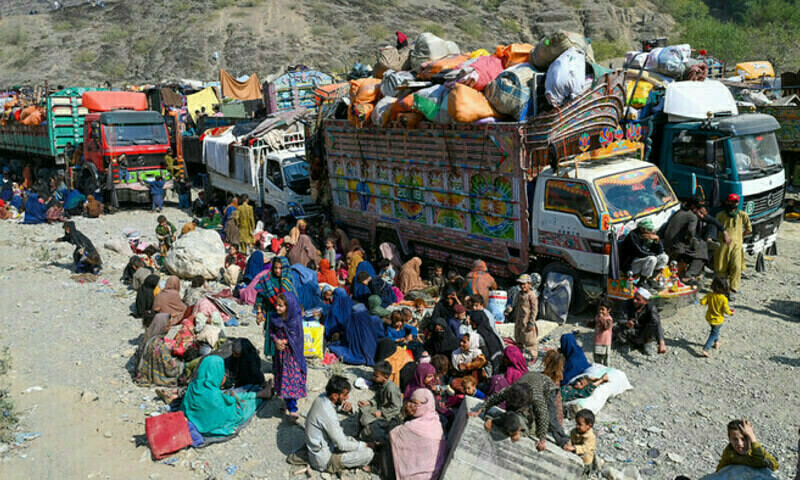Taliban’s border provocations: A desperate attempt to shield terrorism originating from Afghan soil
Heavy cross-border firing continues between Pakistan and Afghanistan at the Torkham-Jalalabad border as the Interim Afghan Government (IAG) persists with construction in disputed territory despite multiple warnings from Pakistan.
According to sources, a mortar shell landed in Torkham’s Bacha Mena area during the exchange, critically injuring customs clearance agent Ishaq Khan.
The border remains closed for the 12th consecutive day, halting trade and the movement of civilians.
Both sides have reportedly engaged heavy weaponry, escalating tensions in the region.
Also, read this
Tensions erupt again at Torkham border as Pak-Afghan forces clash
Tensions escalated at Torkham border as Pakistan, Afghanistan forces clash
Torkham border remains closed for 10th day as exchange of fire reported
Despite Pakistan’s diplomatic engagement and repeated cautions, the Afghan Taliban have pressed ahead with infrastructure projects in contested areas along the border.
The provocation has led to intense clashes, disrupting trade and civilian movement at the crucial border crossing.
Pakistani officials have condemned the move, calling it a deliberate attempt to create instability.
Desperation to shield TTP militants
The Taliban regime’s repeated border provocations appear to be a desperate effort to deflect attention from its continued support of the banned Tehreek-e-Taliban Pakistan (TTP).
Intelligence reports suggest that TTP militants operate freely from Afghan soil, using the country as a base to orchestrate attacks against Pakistan. By fuelling border skirmishes, the Taliban seek to shift focus away from their complicity in harbouring terrorists.
A United Nations Security Council report said an increased collaboration between the TTP and Afghan Taliban in the cross-border terrorist attacks mainly against Pakistani military posts.
The report of the Security Council’s Analytical Support and Sanctions Monitoring Team said that Pakistan suffered more than eight hundred attacks in the past several months.
It said the terrorist threat emanating from Afghanistan is causing heightened concern in many UN member states.
The report said there is increased support and collaboration between TTP and the Taliban, sharing manpower and training camps in Afghanistan and conducting more lethal attacks under the banner of Tehrik-e-Jihad Pakistan.
The body’s 35th report confirms the Afghan Taliban’s logistical, operational, and financial support for the TTP, mentioning that the status and strength of the TTP in Afghanistan remain unchanged, with over 600 attacks recorded in 2024, including cross-border assaults from Afghan territory.
Meanwhile, the TTP has expanded its training infrastructure, establishing new centres in Kunar, Nangarhar, Khost, and Paktika (Barmal) provinces. The group has also increased recruitment efforts, including drawing fighters from the Afghan Taliban.
Neglecting internal crises
Rather than addressing Afghanistan’s pressing economic and humanitarian crises, the Taliban leadership remains fixated on border tensions.
Observers argue that the Taliban are deliberately escalating conflicts to divert attention from their governance failures.
The move has further strained diplomatic relations and worsened Afghanistan’s already fragile international standing.
Beyond its rhetoric of seeking regional stability, the Afghan Taliban continues to provide sanctuary to TTP and other militant groups, posing a grave security risk to Pakistan and the broader region.
The unchecked presence of such elements has raised concerns among neighboring countries and international stakeholders about Afghanistan becoming a safe haven for extremist activities.
Pakistan has intensified counter-terrorism operations, targeting TTP hideouts within its borders.
Security analysts believe that the Taliban’s frustration over these decisive actions has prompted further border skirmishes.
Pakistan’s military leadership has reiterated its commitment to neutralising terrorist threats and ensuring border security.
The Taliban’s reckless actions not only endanger Afghan civilians but also isolate them further from the global community.
By prioritising alliances with terrorist factions over their people’s welfare, the regime risks deepening Afghanistan’s economic woes and exacerbating humanitarian crises.
The Taliban’s aggressive stance at the Pakistan-Afghanistan border underscores a larger strategy of deflection and disruption.
As Pakistan strengthens its counter-terrorism measures, the Taliban’s desperation becomes more apparent.
Diplomatic efforts remain crucial in addressing the crisis, but Afghanistan’s leadership must choose stability over conflict to prevent further regional turmoil.
For the latest news, follow us on Twitter @Aaj_Urdu. We are also on Facebook, Instagram and YouTube.























Comments are closed on this story.